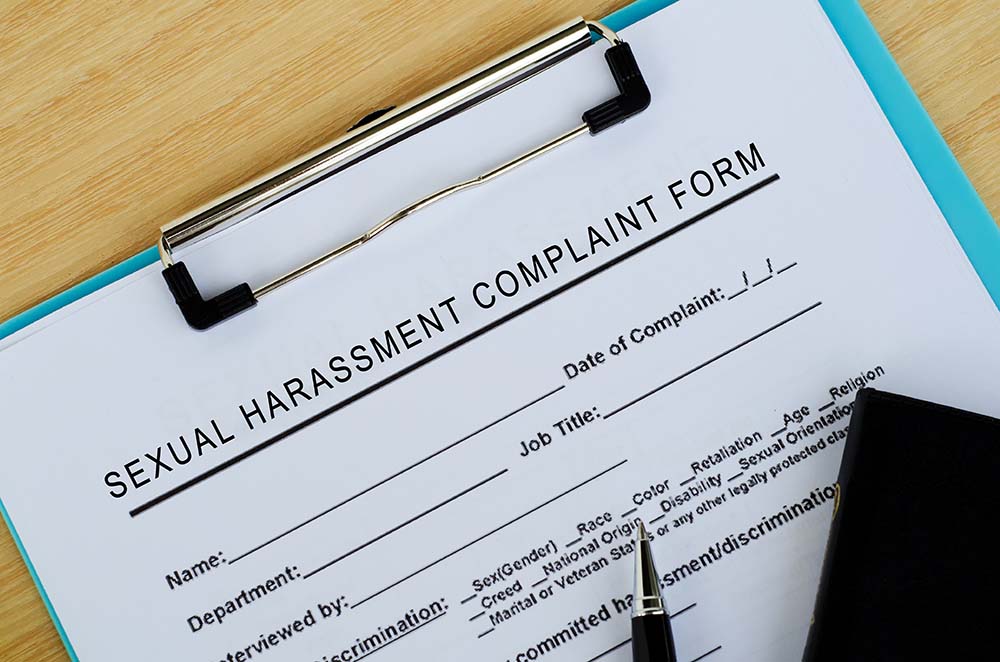Ten years after the Sexual Harassment of Women at Workplace (Prevention, Prohibition and Redressal) Act, 2013 (PoSH) came into force, the Supreme Court Bench of India has said there is “uncertainty” regarding its implementation “It is disquieting to note that there are serious lapses in the enforcement” of the PoSH Act, almost a decade into its enactment – the Supreme Court (SC) in a recent court ruling said after releasing a slew of directions to ensure its effective implementation. The court underlined how “being a victim of such a deplorable act not only dents the self-esteem of a woman, it also takes a toll on her emotional, mental and physical health.” Many of them are “reluctant to report such misconduct” and even “drop out from their job.” “If the authorities/managements/employers cannot assure (women) a safe and secure workplace, they will fear stepping out of their homes to make a dignified living and exploit their talent and skills to the hilt”, said the court.

Incidentally, an investigation by The Indian Express on May 4 revealed that half of the national sports federations don’t have sexual harassment panels as per law. The daily found that five federations, including wrestling, don’t have an Internal Complaints Committee (ICC); four don’t have the stipulated number of members; another six lacked the mandatory external member and one federation had two panels but none with an independent member. “This is indeed a sorry state of affairs and reflects poorly on all the state functionaries, public authorities, private undertakings, organizations and institutions that are duty bound to implement the PoSH Act in letter and spirit,” wrote Hima Justice Kohli referring to the report.
The Supreme Court has directed the Centre, states and Union Territories “to undertake a time-bound exercise” to verify whether all Ministries, Departments, Government organisations, authorities, Public Sector Undertakings, institutions, and bodies, have internal committees “strictly” in terms of PoSH Act. The bench directed that “a similar exercise be undertaken by all statutory bodies of professionals at the apex level and the state level (including those regulating doctors, lawyers, architects, chartered accountants, cost accountants, engineers, bankers and other professionals), by Universities, colleges, educational institutions, and by government and private hospitals/nursing homes.” The court has also called for “immediate and effective steps” by the authorities to “familiarise” committee members with their “duties and how an inquiry ought to be conducted.”

However, the law is largely inaccessible to women workers in the informal sector as more than 80 per cent of India’s women workers are employed in the informal sector. Additionally, experts have noted that sexual harassment cases in a professional set-up are hugely underreported in India for several reasons:
• The inefficient functioning and the lack of clarity in the law about how to conduct such inquiries
• Lack of awareness among women employees about such committees and who to approach in case of facing harassment.
• The power dynamics of organisations and fear of professional repercussions also stand in the way of women filing complaints.
• Lack of clarity for women students or professionals at educational institutions
In cases of sexual harassment, concrete evidence is often lacking but does not necessarily amount to the absence of a crime.
How Was The POSH Act Formed?

In 1992, Bhanwari Devi, a social worker with the Women’s Development Project of the Rajasthan government was gang-raped by five men after she tried to prevent the marriage of a one-year-old girl. While hearing pleas filed by activist groups against the crime, the Supreme Court, noting the absence of any law “enacted to provide for effective enforcement of the basic human right of gender equality” guarantee against “sexual harassment at workplaces”, laid down a set of guidelines in 1997, christened the Vishakha Guidelines, to fill the statutory vacuum till a law could be enacted. Advocate Janki Gupta said, “These were to be “strictly observed in all workplaces” and were binding and enforceable in law. At that time and even today, no educational institutions or sporting bodies were mentioned in black and white.”
The Court drew its strength from several provisions of the Constitution including Article 15 (against discrimination on grounds only of religion, race, caste, sex, and place of birth), also drawing from relevant International Conventions and norms such as the General Recommendations of the Convention on the Elimination of All Forms of Discrimination Against Women (CEDAW), which India ratified in 1993. Meanwhile, the National Commission for Women submitted drafts of a Code of Conduct for the Workplace in 2000, 2003, 2004, 2006 and 2010. After this, the Protection of Women against Sexual Harassment at Workplace Bill was introduced by then Women and Child Development Minister, Krishna Tirath, in 2007. It was later tabled in Parliament and went through amendments. The amended Bill came into force on December 9, 2013, as the Sexual Harassment of Women at Workplace (Prevention, Prohibition and Redressal) or POSH Act.
What Are The Requirements Imposed On Employers?
“The law clearly states any employer or organisation with more than 10 employees to form an ICC which can be approached by any woman employee to file a formal sexual harassment complaint,” said Gupta.
• The ICC has to be headed by a woman,
• Have at least two women employees, another employee
• To pre-empt any undue pressure from senior levels, include a third party such as an NGO worker with five years of experience, familiar with the challenges of sexual harassment.
• The Act also mandates every district in the country to create a local committee (LC) to receive complaints from women working in firms with less than 10 employees and from the informal sector, including domestic workers, home-based workers, voluntary government social workers and so on
“The law dictates that these two bodies have to conduct inquiries in line with the POSH Act and comply with the “principles of natural justice” stated in the Rules of the Act. The employer has to file an annual audit report with the district officer about the number of sexual harassment complaints filed and actions taken at the end of the year. It also makes the employer duty-bound to organise regular workshops and awareness programmes to educate employees about the Act, and conduct orientation and programmes for ICC members,” added Gupta. If the employer fails to constitute an ICC or does not abide by any other provision, they must pay a fine of up to ₹50,000, which increases for a repeat offence.
What Constitutes Sexual Harassment Under The POSH Act?

A ‘Handbook on Sexual Harassment of Women at Workplace’ published by the Ministry of Women & Child Development contains detailed instances of behaviour that constitute sexual harassment at the workplace. The Handbook says “unwelcome behaviour” is experienced when the victim feels bad or powerless, and when it causes anger/ sadness or negative self-esteem. Unwelcome behaviour is “illegal, demeaning, invading, one-sided and power-based”. Under the 2013 law, sexual harassment includes “any one or more” of the following “unwelcome acts or behaviour” committed directly or by implication:
• Physical contact and advances
• A demand or request for sexual favours
• Sexually coloured remarks
• Showing pornography
• Any other unwelcome physical, verbal or non-verbal conduct of sexual nature.
• Sexually suggestive remarks or innuendo; serious or repeated offensive remarks; inappropriate questions or remarks about a person’s sex life;
• Display of sexist or offensive pictures, posters, MMS, SMS, WhatsApp, or emails;
• Intimidation, threats, and blackmail around sexual favours;
• Threats, intimidation or retaliation against an employee who speaks up about these;
• Unwelcome social invitations with sexual overtones, commonly seen as flirting; and
• Unwelcome sexual advances.
In addition, the PoSH Act mentions five circumstances that amount to sexual harassment:
1. Implied or explicit promise of preferential treatment in her employment;
2. Implied or explicit threat of detrimental treatment;
3. Implied or explicit threat about the complainant’s present or future employment status;
4. Interference with the complainant’s work or creating an offensive or hostile work environment;
5. Humiliating treatment of the complainant that is likely to affect her health or safety.
What Is The Procedure For Complaint Under The Act?
The aggrieved victim doesn't need to file a complaint for the ICC to act. The Act says that she “may” do so — and if she cannot, any member of the ICC “shall” render “all reasonable assistance” to her to complain in writing.
• If the woman cannot complain because of “physical or mental incapacity or death or otherwise”, her legal heir may do so.
• Under the Act, the complaint must be made “within three months from the date of the incident”. However, the ICC can “extend the time limit” if “it is satisfied that the circumstances were such which prevented the woman from filing a complaint within the said period”.
• The ICC “may”, before the inquiry, and “at the request of the aggrieved woman, take steps to settle the matter between her and the respondent through conciliation” — provided that “no monetary settlement shall be made as a basis of conciliation”.
• The ICC may either forward the victim’s complaint to the police, or it can start an inquiry that has to be completed within 90 days. The ICC has powers similar to those of a civil court regarding summoning and examining any person on oath and requiring the discovery and production of documents.
• When the inquiry is completed, the ICC must provide a report of its findings to the employer within 10 days. The information must also be made available to both parties.
• The identity of the woman, respondent, witness, and any information on the inquiry, recommendation and action taken, should not be made public.
What Can One Expect After The ICC Has Filed Its Report?
If the allegations of sexual harassment are proven, the ICC will recommend to the employer to act “in accordance with the provisions of the service rules” of the company. These may vary from company to company.
• The ICC may recommend that the company deduct the salary of the person found guilty, “as it may consider appropriate”. The compensation is determined based on five aspects: suffering and emotional distress caused to the woman; loss of career opportunity; her medical expenses; income and financial status of the respondent; and the feasibility of such payment.
• If either the aggrieved woman or the respondent is not satisfied, they may appeal in court within 90 days.
A False Complaint Of Sexual Harassment?
Section 14 of the Act deals with punishment for false or malicious complaints and false evidence. In such a case, the ICC “may recommend” to the employer that it take action against the person who has made the complaint, in “accordance with the provisions of the service rules”. The Act, however, makes it clear that action cannot be taken for “mere inability” to “substantiate the complaint or provide adequate proof”. Gupta points out that, “In multiple judicial interventions, the courts have been seen to be unwilling in addressing this inherent tension and ended up giving more reliance on evidence. Women have even been penalised and lost their employment. It is a known fact that women are disproportionately affected in patriarchal systems.”